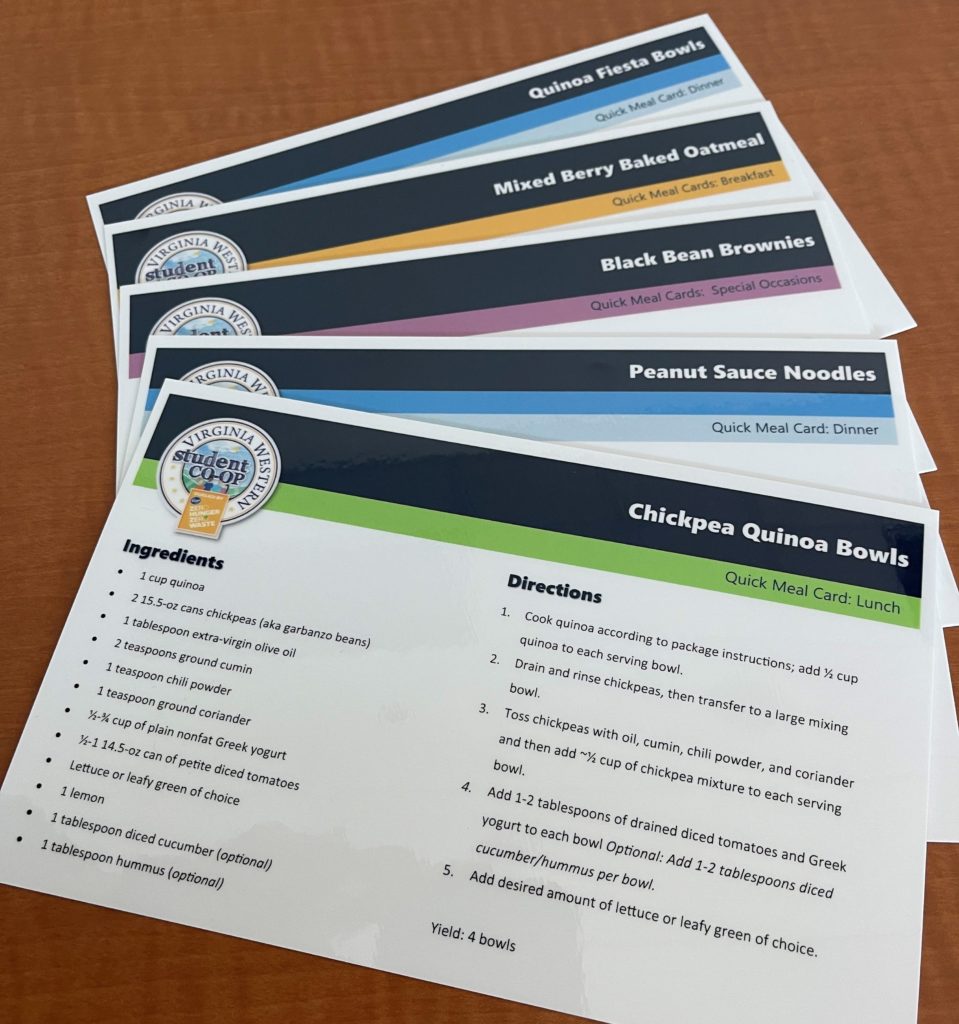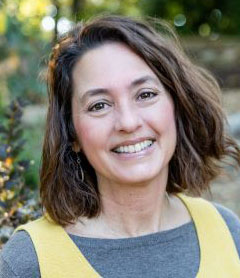As much as I want to eat healthy, so much comes down to convenience.
For me, cooking is more of a chore than a creative act.
This is why I loved “Meals that Heal,” a cookbook that showed me how to eat more anti-inflammatory foods. Author Carolyn Williams (PhD, RD) recommends having easily accessible, minimally processed meal components ready to go. She calls these “simple staples,” and for my kitchen, that means eggs and canned pinto beans for quick tacos; frozen berries for smoothies; and pre-cut veggies for … everything.
Make it tasty, make it easy.

This is exactly the thinking behind our Co-op Quick Meal Cards grant project, which was made possible by the Virginia Foundation for Community College Education (VFCCE).
Student Activities Coordinator Natasha Lee came up with the concept, wrote the proposal, and managed the six-month project, which was funded by the Anthem Foundation Hunger Relief Grant Program.
With this $5,000 award, the college commissioned more than 60 laminated “quick meal cards,” which will be displayed in the Virginia Western Student Co-op, fueled by Kroger.
The recipes were created and curated by registered dietitians, including Evita Huang, a 2016 VWCC alumna who recently graduated with a master’s in Nutrition and Dietetics from Virginia Tech. (Go, Evita!)
With these recipes, students can transform pantry staples (including rice, quinoa, beans, tuna, and peanut butter) into tasty and nutritious breakfasts, lunches, dinners, or snacks.
The co-op will rotate these cards each season, displaying 10 to 12 cards at a time inside the pantry, which is located on the top floor of the Student Life Center. Grant funding also established a card template, so the recipe catalog can be updated for years to come.
Since the cards were created, the pantry has stocked more nutritious and less processed foods for these quick recipes.
I was curious — and getting hungry — as I learned more about the project, so Natasha shared a bunch of recipes perfect for the summer months, including:
- Greek Yogurt Ranch Dip
- Chickpea Quinoa Bowls
- Three Bean Salad
- No-Bake Peanut Butter Energy Balls
- Black Bean Burger Patties
- Blueberry Crisp
I couldn’t choose just one recipe to highlight, so I’m including all six PDFs for download (and they are easy to print).
As Natasha noted, these recipes are ideal for summer cookouts and picnics:
Many thanks to Natasha, the VFCCE, and Virginia Western’s Educational Foundation for their ongoing (and delicious) support of our students.
Call 540-857-6326 or email Natasha Lee at nlee@virginiawestern.edu for more information.

Funding opportunities
- Virginia Humanities SHARP Grants: Funding through NEH provides awards to support recovery and revitalization of museums, libraries, archives, historic sites and other nonprofits impacted by the COVID-19 pandemic. Awards range from $4,000 to $20,000 and can support humanities programming, including the expansion of outdoor and virtual programming and digital transition in support of preservation and access programs. Deadline: Aug. 16. More information.
Grant starter kit
- Watch the video: 12 places to find grants
- Search Foundation Directory Online (for free through the Roanoke library)
- Email sseagle@virginiawestern.edu with questions and ideas!
Free professional learning opportunities
Go2Knowledge: All VCCS faculty and staff have free, unlimited access to live webinars and on-demand training provided by Go2Knowledge. The live webinars are highlighted at the top of the Go2Knowledge dashboard, but you can search through an entire library of recorded, on-demand sessions on topics including teaching and learning, campus safety, institutional effectiveness, and student success.
Some upcoming live webinars:
- Thursday, July 15: Planning for a Safe Return to Campus: HR, Public Safety, Training and Communication, 3 to 4 p.m.
- Thursday, July 15: Assessing Social Media Posts & Online Communication: Case Studies on Venting, Trolling & Violence, 1 to 2:30 p.m.
- Friday, July 16: Addressing Student Learning Loss: Planning for the Fall 2021 Start, noon to 12:45 p.m.
- Tuesday, July 20: Top 5 Research-Based Study Skills: How to Incorporate Them Into Your Course, 1 to 2 p.m.
- Tuesday, July 20: Online Orientation for TRIO Students: Using Technology for Onboarding and Success, 3 to 4 p.m.
- Tuesday, July 20: Online Orientation: College Case Studies and California College Partnership, 3 to 4 p.m.
- Wednesday, July 21: Lessons Learned from COVID-19: How to Adapt, Overcome and Enhance Higher Ed, 1 to 2:30 p.m.
- Thursday, July 22: Supporting the Asian Student Community: Diversity, Equity and Inclusion, 1 to 2 p.m.
- Thursday, July 29: Online Peer Mentoring: Meeting the Unique Needs of Non-Traditional Students (back by popular demand), 1 to 2:30 p.m.
You can access Go2Knowledge on your MyVWCC dashboard or here: Go2Knowledge.org/vccs
The Future Trends Forum: Discussions about the future of education and technology with writer/futurist Bryan Alexander. Thursday, July 15, at 2 p.m.: The history of personalized learning. What does personalized mean? What can we learn from the history of personalized learning technology? With leading ed tech critic Audrey Watters, author of “Teaching Machines: The History of Personalized Learning.” More upcoming programs. Video recordings available on YouTube.
The #RealCollege Virtual Journey, sponsored by the Hope Center for College, Community, and Justice. A series of online workshops and engaging activities led by experts and delivered free of charge. The theme for August is Higher Ed Finance. Aug. 4, 3 p.m.: “The State Must Provide,” a special event with author Adam Harris. Two webinars on Aug. 25: (1) Equity Avengers: Presidential Perspectives on Institutional Budgets and (2) The Free College Movement and Students’ Basic Needs. Both at 3 p.m. Register here. Recordings of previous events are available by scrolling down this page.
Chronicle of Higher Education: Upcoming and on-demand virtual events
Bookmark the VCCS professional development website
Thank you for reading. Why does Stephanie Ogilvie Seagle feature free learning opportunities on the Green House Grants Blog? Because we transform ourselves by learning like our students. All of us are teachers and learners, no matter our titles.






 Shelley Lyons is glad to be back on campus as she is a Virginia Western alum, and has served as the Administrative Officer for Grants Administration at Virginia Western since early 2022. Prior to VWCC, her career focus was within the Human Services and Arts fields. She wrote her first grant in 1996 on a whim and has continued to plan and learn since that time. She most enjoys seeing a well-planned project come to fruition, where funder, project manager and beneficiaries can all feel success and see impact.
Shelley Lyons is glad to be back on campus as she is a Virginia Western alum, and has served as the Administrative Officer for Grants Administration at Virginia Western since early 2022. Prior to VWCC, her career focus was within the Human Services and Arts fields. She wrote her first grant in 1996 on a whim and has continued to plan and learn since that time. She most enjoys seeing a well-planned project come to fruition, where funder, project manager and beneficiaries can all feel success and see impact.